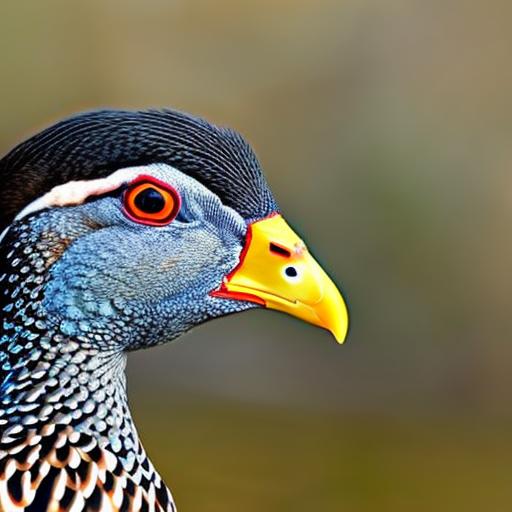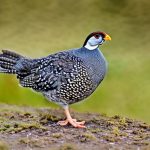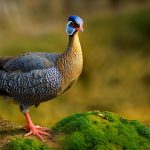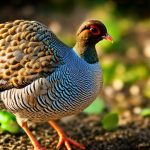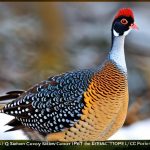Keeping guinea fowl with ducks can be a rewarding experience for poultry enthusiasts. Guinea fowl are known for their pest control abilities, as they are excellent at foraging for insects and ticks. Ducks, on the other hand, are great foragers and can help keep the grass and weeds in check. When kept together, guinea fowl and ducks can create a harmonious and efficient pest control team for your property. Additionally, both guinea fowl and ducks are relatively low-maintenance birds, making them a great choice for beginners or those looking to add diversity to their flock.
Guinea fowl and ducks also have different personalities and behaviors, which can make for an interesting and dynamic flock. Guinea fowl are known for their loud calls and alert nature, while ducks are more docile and sociable. When kept together, they can complement each other and create a diverse and lively poultry community. However, it’s important to understand the specific needs and requirements of both guinea fowl and ducks in order to successfully keep them together. In this article, we will explore the housing, feeding, health management, social dynamics, predator protection, and breeding aspects of keeping guinea fowl with ducks to help you create a thriving and harmonious poultry environment.
Key Takeaways
- Keeping guinea fowl with ducks can be beneficial as they can help control pests and provide companionship for each other.
- Guinea fowl and ducks require adequate housing and space to roam and forage, with separate areas for nesting and roosting.
- Both guinea fowl and ducks have specific dietary needs and require a balanced diet to maintain their health and productivity.
- Regular health checks and disease management are essential for both guinea fowl and ducks to prevent and treat any potential illnesses.
- Guinea fowl and ducks can coexist peacefully, but it’s important to monitor their social dynamics and provide enough space to avoid overcrowding and aggression.
Housing and Space Requirements for Guinea Fowl and Ducks
When keeping guinea fowl with ducks, it’s important to provide adequate housing and space for both species. Guinea fowl are known for their roosting behavior and prefer to perch off the ground at night. They also require protection from the elements and predators, so a secure coop or shelter is essential. Ducks, on the other hand, need access to water for swimming and bathing, as well as protection from predators. When designing a coop or shelter for guinea fowl and ducks, it’s important to consider their specific needs and behaviors.
For guinea fowl, a raised roosting area with ample space for perching is essential. The coop should also have nesting boxes for egg-laying and protection from the elements. Ducks, on the other hand, require a water source for swimming and bathing, as well as nesting areas for egg-laying. The coop should also have adequate ventilation and protection from predators. When it comes to space requirements, guinea fowl and ducks both need ample room to roam and forage. A general rule of thumb is to provide at least 4 square feet of space per bird in the coop, and 10 square feet of space per bird in the outdoor run or pasture. Providing ample space will help prevent overcrowding and reduce the risk of aggression or territorial behavior between guinea fowl and ducks.
Feeding and Nutrition for Guinea Fowl and Ducks
Feeding and nutrition are important aspects of keeping guinea fowl with ducks. Both species have specific dietary needs that must be met in order to maintain their health and well-being. Guinea fowl are omnivorous birds that require a diet high in protein, which can be obtained from insects, seeds, grains, and commercial poultry feed. They also require access to grit for digestion and calcium for egg production. Ducks are also omnivorous and require a diet high in protein, which can be obtained from insects, aquatic plants, grains, and commercial poultry feed. They also require access to water for drinking and swimming, as well as grit for digestion.
When feeding guinea fowl and ducks together, it’s important to provide a balanced diet that meets the specific nutritional needs of both species. This can be achieved by offering a high-quality poultry feed that is formulated for both guinea fowl and ducks. Additionally, providing access to a diverse range of forage, such as insects, seeds, grains, and aquatic plants, can help supplement their diet and provide enrichment. It’s also important to monitor their food intake and adjust their diet as needed based on their activity level, age, and reproductive status. By providing a balanced and nutritious diet, you can help ensure the health and vitality of your guinea fowl and ducks.
Health and Disease Management for Guinea Fowl and Ducks
Health and disease management are important considerations when keeping guinea fowl with ducks. Both species are susceptible to a range of common poultry diseases and parasites, so it’s important to implement a proactive health management plan to prevent illness and maintain the overall well-being of your flock. Regular health checks, vaccination programs (if applicable), parasite control, and biosecurity measures are essential components of a comprehensive health management plan for guinea fowl and ducks.
Guinea fowl are known for their hardy nature but can be susceptible to respiratory diseases such as coryza and infectious bronchitis. Ducks are prone to respiratory diseases as well as waterborne illnesses such as duck viral enteritis (DVE) and duck plague. To prevent the spread of disease, it’s important to quarantine new birds before introducing them to the flock, practice good hygiene in the coop and outdoor areas, and provide regular veterinary care. Additionally, providing a clean and dry living environment, access to fresh water, proper nutrition, and regular monitoring of their behavior and appearance can help identify any potential health issues early on.
Social Dynamics and Compatibility between Guinea Fowl and Ducks
Understanding the social dynamics and compatibility between guinea fowl and ducks is essential for creating a harmonious poultry environment. Guinea fowl are known for their alert nature and can be territorial at times, especially during the breeding season. Ducks, on the other hand, are more sociable and tend to form close-knit groups within the flock. When kept together, it’s important to provide ample space and resources to prevent competition or aggression between guinea fowl and ducks.
Introducing guinea fowl and ducks at a young age can help promote socialization and reduce the risk of aggression or territorial behavior. Providing multiple feeding stations, water sources, nesting areas, and roosting spots can also help reduce competition between the two species. It’s also important to monitor their behavior closely and intervene if any signs of aggression or stress are observed. By understanding the social dynamics of guinea fowl and ducks, you can create a peaceful and cohesive flock that thrives in a shared environment.
Predator Protection for Guinea Fowl and Ducks

Predator protection is a critical aspect of keeping guinea fowl with ducks, as both species are vulnerable to predation from a range of common predators such as foxes, raccoons, hawks, and snakes. When designing a coop or shelter for guinea fowl and ducks, it’s important to implement predator-proofing measures such as secure fencing, hardware cloth on windows and doors, predator-proof latches, and electric fencing if necessary.
In addition to securing their living environment, it’s important to provide adequate supervision during free-ranging activities to prevent potential predator attacks. Providing sheltered areas for hiding or roosting during the night can also help reduce the risk of predation. It’s also important to be vigilant in monitoring the surrounding area for signs of predators and take proactive measures to deter them from approaching the flock. By implementing effective predator protection measures, you can help ensure the safety and security of your guinea fowl and ducks.
Breeding and Reproduction of Guinea Fowl and Ducks
Breeding and reproduction are natural behaviors for guinea fowl and ducks that can be an exciting aspect of keeping these species together. Guinea fowl are known for their seasonal breeding behavior, with males displaying elaborate courtship displays to attract females. Ducks are also seasonal breeders that require access to water for mating rituals and egg-laying. When breeding guinea fowl with ducks, it’s important to provide suitable nesting areas that meet the specific needs of each species.
Guinea fowl prefer secluded nesting areas with ample bedding material for egg-laying, while ducks require access to water for mating rituals and egg-laying. Providing separate nesting areas for guinea fowl and ducks can help reduce competition or aggression during the breeding season. It’s also important to provide proper nutrition, access to clean water, and regular monitoring of their reproductive behavior to ensure successful breeding outcomes. By understanding the natural breeding behaviors of guinea fowl and ducks, you can create an environment that supports their reproductive needs while maintaining a healthy and thriving flock.
In conclusion, keeping guinea fowl with ducks can be a rewarding experience that offers pest control benefits as well as a diverse and dynamic poultry community. By understanding the specific housing, feeding, health management, social dynamics, predator protection, and breeding aspects of keeping guinea fowl with ducks, you can create a harmonious environment that supports the well-being of both species. With proper care and attention to their individual needs, guinea fowl and ducks can thrive together in a shared environment while providing valuable contributions to your property.
If you’re considering keeping guinea fowl with ducks, you may also be interested in learning about the housing needs of turkeys. Poultry Wizard has a helpful article on whether turkeys need a coop, which provides valuable insights into creating suitable living spaces for different types of poultry. Check it out here.
FAQs
What are the benefits of keeping guinea fowl with ducks?
Guinea fowl are excellent foragers and can help control insect populations around the duck area. They are also good at alerting the ducks to potential predators.
What should be considered before keeping guinea fowl with ducks?
It’s important to consider the space requirements for both guinea fowl and ducks, as well as their different dietary needs. Additionally, guinea fowl can be noisy, which may not be suitable for all environments.
How do guinea fowl and ducks interact with each other?
Guinea fowl and ducks can coexist peacefully, but it’s important to introduce them to each other gradually to minimize any potential conflicts. They may also establish a pecking order within the flock.
What are some potential challenges of keeping guinea fowl with ducks?
Guinea fowl can be more aggressive than ducks, so it’s important to monitor their interactions and ensure that all birds have access to food and water. Additionally, guinea fowl may roost in trees at night, while ducks prefer to stay on the ground.
Are there any health considerations when keeping guinea fowl with ducks?
It’s important to monitor the health of both guinea fowl and ducks, as they may be susceptible to different diseases and parasites. Providing a clean and well-maintained living environment is essential for their overall well-being.
Meet Walter, the feathered-friend fanatic of Florida! Nestled in the sunshine state, Walter struts through life with his feathered companions, clucking his way to happiness. With a coop that’s fancier than a five-star hotel, he’s the Don Juan of the chicken world. When he’s not teaching his hens to do the cha-cha, you’ll find him in a heated debate with his prized rooster, Sir Clucks-a-Lot. Walter’s poultry passion is no yolk; he’s the sunny-side-up guy you never knew you needed in your flock of friends!

